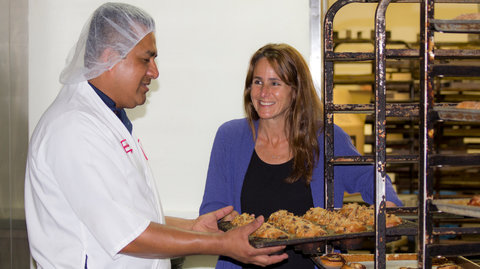 Courtesy of Baked in the Sun Rachel Shein: “I think most of my young and healthy workers won’t buy any insurance.”
Courtesy of Baked in the Sun Rachel Shein: “I think most of my young and healthy workers won’t buy any insurance.”
Case Study
What would you do with this business?
With President Obama pushing back an important start date for the Affordable Care Act, giving companies with 50 or more full-time employees an extra year before they are required to offer health insurance to their workers, we decided to check in with Rachel Shein and her wholesale bakery, Baked in the Sun.
In March, Ms. Shein and her bakery, based near San Diego, were featured in a case study that looked at what she would have to do to comply with the new health care law. With insurance companies still developing their offerings for businesses like hers, Ms Shein was delighted to learn that the employer mandate was being delayed. “I was thrilled when I heard we had the extra time to watch and wait,” she said.
At the time the case study was written, Ms. Shein had been quite concerned about the potential effects of the law’s implementation. “We saw it as a significant cost to our business, one we hadn’t built into our business model,” she said. Her participation in the case study led to appearances on several TV news programs, including on Fox Business and CNBC.
Initially, Ms. Shein estimated that she would have to pay $108,000 a year to include the 90 employees who are not currently covered by her company’s health insurance. Her insurance broker now believes that when the final rates are published for next year, the cost will be higher than that.
Ms. Shein, though, will have to pay for only those employees who sign up for the plan she offers, and so far, the plans she has seen have not seemed terribly attractive. One sample plan, she said, included a $4,500 deductible, which Ms. Shein said “is too high for low-wage workers, so my employees may be better off going to the state-run market for individuals, which seems to have more options and better prices.”
Insurance company offerings for businesses like hers are expected to evolve, Ms. Shein said, and she hopes better plans and choices become available, as they have on the individual exchange. Right now, Ms. Shein doesn’t know the final costs or how many of her employees will sign up, so she has not been able to estimate her expenses with any confidence. “It’s still very messy,” she said.
The delay is an opportunity for both companies and employees, Ms. Shein said, because it gives business owners more time to shop around and workers can take the year to see what is available on the exchange before they decide if they will take company-offered insurance.
Ms. Shein is also interested to see if the managers who are covered by her company’s insurance plan find a better deal on the state-run market. She said she believed all workers should have health insurance, and she and her husband have wrestled with the problem for years. In her experience, she said, many of her employees are resistant to coverage that requires an employee contribution. “They are mostly young and healthy,” she said, also noting that the individual penalty for not carrying insurance is low, “and they would rather have a bit more in their paycheck than health insurance.”
For now, she plans to focus on running her baking company. “The recession has made us more efficient,” she said. “We’ve automated more and focused on the most profitable parts of the business. I can’t control the insurance rates, but I can make a great espresso mocha scone.”
This post has been revised to reflect the following correction:
Correction: July 17, 2013
A previous version of this post reported incorrectly that it was Congress that had delayed the employer mandate.
Article source: http://boss.blogs.nytimes.com/2013/07/16/a-bakery-is-relieved-to-have-the-employer-mandate-delayed/?partner=rss&emc=rss
Speak Your Mind
You must be logged in to post a comment.